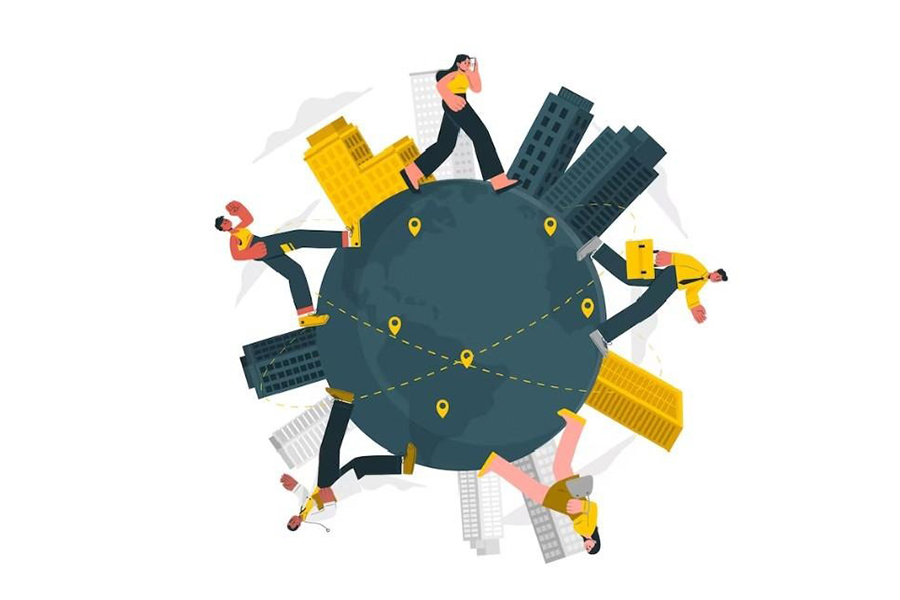
Films Review | Sep 10,2022
May 14 , 2022
By Dani Rodrik
The post-1990s era of hyper-globalisation is now commonly acknowledged to have come to an end. The COVID-19 pandemic and Russia’s war against Ukraine have relegated global markets to a secondary and at best supporting role behind national objectives – in particular, public health and national security. But all the talk about deglobalisation should not blind us to the possibility that the current crisis may in fact produce a better globalisation.
In truth, hyper-globalisation had been in retreat since the global financial crisis of 2007-08. The share of trade in world GDP began to decline after 2007, as China’s export-to-GDP ratio plummeted by a remarkable 16 percentage points. Global value chains stopped spreading. International capital flows never recovered to their pre-2007 heights. And populist politicians openly hostile to globalisation became much more influential in the advanced economies.
Hyper-globalisation crumbled beneath its many contradictions. First, there was stress between the beneficial properties from specialisation and the beneficial properties from productive diversification. The precept of the comparative benefit held that international locations ought to specialise in what they had been presently good at producing. However, a protracted line of developmental pondering advised that governments ought to as a substitute push nationwide economies to supply what richer international locations did. The consequence was the battle between the interventionist insurance policies of essentially the most profitable economies, notably China, and the “liberal” rules enshrined on the buying and selling system.
Second, hyper-globalisation exacerbated distributional issues in lots of economies. The inevitable flip facet of the beneficial properties from commerce was the redistribution of revenue from its losers to its winners. And as globalisation deepened, redistribution from losers to winners grew ever bigger relative to the web's beneficial properties. Economists and technocrats who pooh-poohed the central logic of their self-discipline ended up undermining public confidence in it.
Third, hyper-globalisation undermined the accountability of public officers to their electorates. Calls to rewrite globalisation’s guidelines had been met with the retort that it was immutable and irresistible – “the financial equal of a drive of nature, like wind or water,” as US President Clinton put it. To those that questioned the prevailing system, UK Prime Minister Tony Blair responded that, “You would possibly as properly debate whether or not autumn ought to comply with summer season.”
Fourth, the zero-sum logic of nationwide safety and geopolitical competitors was antithetical to the positive-sum logic of worldwide financial cooperation. With China’s rise as a geopolitical rival to America, and Russia’s invasion of Ukraine, strategic competitors have reasserted themselves over economics.
With hyper-globalisation having collapsed, situations for the world financial system run the gamut. The worst consequence, recalling the 1930s, can be withdrawal by international locations (or teams of nations) into autarky. A much less dangerous, nonetheless ugly, chance is that the supremacy of geopolitics signifies that commerce wars and financial sanctions turn into an everlasting characteristic of worldwide commerce and finance. The primary situation appears unlikely – the world financial system is extra interdependent than ever, and the financial prices can be big – however, we can not rule out the second.
But, it is usually potential to envisage a very good situation whereby we obtain greater stability between the prerogatives of the nation-state and the necessities of an open financial system. Such a rebalancing would possibly allow inclusive prosperity at home and peace and safety overseas.
Step one is for policymakers to fix the injury achieved to economies and societies by hyper-globalisation, together with different market-first insurance policies. This may require reviving the spirit of the Bretton Woods period, when the worldwide financial system served financial and social objectives – full employment, prosperity, and fairness – more reasonably than the opposite. Under hyper-globalisation, policymakers inverted this logic, with the worldwide financial system turning into the top and home society the means. Worldwide integration then led to home disintegration.
Some would possibly fear that emphasising home financial and social aims would undermine financial openness. In actuality, shared prosperity makes societies safer and extra prone to openness to the world. A key lesson of financial principle is that commerce advantages, however solely so long as distributive considerations are addressed. It is within the self-interest of well-managed, well-ordered international locations to be open. That is additionally the lesson of precise expertise beneath the Bretton Woods system, when commerce and long-term funding elevated considerably.
A second essential prerequisite for the great situation is that international locations do not flip a reliable quest for nationwide safety into aggression towards others. Russia might have had cheap considerations about NATO enlargement, however, its struggle in Ukraine is a totally disproportionate response that may seemingly leave Russia much less safe and affluent in the long term.
For other powers, and the US particularly, this implies acknowledging multipolarity and abandoning the hunt for world supremacy. The US tends to treat American predominance in world affairs as righteous because of the pure state of affairs. In this view, China’s financial and technological advances are inherently and self-evidently a risk, and the bilateral relationship is decreased to a zero-sum sport.
Leaving apart the query of whether or not the US can truly forestall China’s relative rise, this mindset is harmful and unproductive. It exacerbates the safety dilemma: American insurance policies designed to undermine Chinese companies resembling Huawei are prone to make China feel threatened and reply in ways which validate US fears of Chinese expansionism. A zero-sum outlook additionally makes it tougher to reap the mutual benefits from cooperation in areas resembling local weather change and world public well being.
The future world need not be where geopolitics trumps everything else and international locations (or regional blocs) decrease their financial interactions with each other. If that dystopian situation does materialise, it will not be attributable to systemic forces overseas. As with hyper-globalisation, it will likely be a result of unsuitable decisions.
PUBLISHED ON
May 14,2022 [ VOL
23 , NO
1150]


Films Review | Sep 10,2022

Editorial | Mar 16,2019

Viewpoints | Jun 19,2021

Fortune News | May 25,2019

Commentaries | May 17,2025

Viewpoints | Apr 19,2025

Films Review | Nov 09,2019

View From Arada | Oct 20,2024

Sunday with Eden | Apr 17,2021

Viewpoints | Sep 10,2022

My Opinion | 131981 Views | Aug 14,2021

My Opinion | 128369 Views | Aug 21,2021

My Opinion | 126307 Views | Sep 10,2021

My Opinion | 123925 Views | Aug 07,2021

Dec 22 , 2024 . By TIZITA SHEWAFERAW
Charged with transforming colossal state-owned enterprises into modern and competitiv...

Aug 18 , 2024 . By AKSAH ITALO
Although predictable Yonas Zerihun's job in the ride-hailing service is not immune to...

Jul 28 , 2024 . By TIZITA SHEWAFERAW
Unhabitual, perhaps too many, Samuel Gebreyohannes, 38, used to occasionally enjoy a couple of beers at breakfast. However, he recently swit...

Jul 13 , 2024 . By AKSAH ITALO
Investors who rely on tractors, trucks, and field vehicles for commuting, transporting commodities, and f...

Jul 5 , 2025
Six years ago, Ethiopia was the darling of international liberal commentators. A year...

Jun 28 , 2025
Meseret Damtie, the assertive auditor general, has never been shy about naming names...

Jun 21 , 2025
A well-worn adage says, “Budget is not destiny, but it is direction.” Examining t...

Jun 14 , 2025
Yet again, the Horn of Africa is bracing for trouble. A region already frayed by wars...

Jul 6 , 2025 . By BEZAWIT HULUAGER
The federal legislature gave Prime Minister Abiy Ahmed (PhD) what he wanted: a 1.9 tr...

Jul 6 , 2025 . By YITBAREK GETACHEW
In a city rising skyward at breakneck speed, a reckoning has arrived. Authorities in...

Jul 6 , 2025 . By NAHOM AYELE
A landmark directive from the Ministry of Finance signals a paradigm shift in the cou...

Jul 6 , 2025 . By NAHOM AYELE
Awash Bank has announced plans to establish a dedicated investment banking subsidiary...